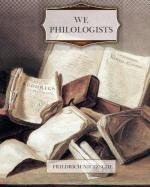PLANS AND THOUGHTS RELATING TO A WORK ON PHILOLOGY
(1875)
26
Of all sciences philology at present is the most favoured . its progress having been furthered for centuries by the greatest number of scholars in every nation who have had charge of the noblest pupils. Philology has thus had one of the best of all opportunities to be propagated from generation to generation, and to make itself respected. How has it acquired this power?
Calculations of the different prejudices in its favour.
How then if these were to be frankly recognised as prejudices? Would not philology be superfluous if we reckoned up the interests of a position in life or the earning of a livelihood? What if the truth were told about antiquity, and its qualifications for training people to live in the present?
In order that the questions set forth above may be answered let us consider the training of the philologist, his genesis: he no longer comes into being where these interests are lacking.
If the world in general came to know what an unseasonable thing for us antiquity really is, philologists would no longer be called in as the educators of our youth.
Effect of antiquity on the non-philologist likewise nothing. If they showed themselves to be imperative and contradictory, oh, with what hatred would they be pursued! But they always humble themselves.
Philology now derives its power only from the union between the philologists who will not, or cannot, understand antiquity and public opinion, which is misled by prejudices in regard to it.
The real Greeks, and their “watering down” through the philologists.
The future commanding philologist sceptical in regard to our entire culture, and therefore also the destroyer of philology as a profession.
THE PREFERENCE FOR ANTIQUITY
27
If a man approves of the investigation of the past he will also approve and even praise the fact—and will above all easily understand it—that there are scholars who are exclusively occupied with the investigation of Greek and Roman antiquity: but that these scholars are at the same time the teachers of the children of the nobility and gentry is not equally easy of comprehension—here lies a problem.
Why philologists precisely? This is not altogether such a matter of course as the case of a professor of medicine, who is also a practical physician and surgeon. For, if the cases were identical, preoccupation with Greek and Roman antiquity would be identical with the “science of education.” In short, the relationship between theory and practice in the philologist cannot be so quickly conceived. Whence comes his pretension to be a teacher in the higher sense, not only of all scientific men, but more especially of all cultured men? This educational power must be taken by the philologist from antiquity; and in such a case people will ask with astonishment: how does it come that we attach such value to a far-off past that we can only become cultured men with the aid of its knowledge?




